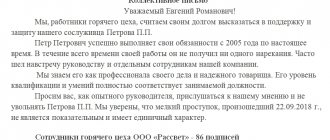A counterclaim to the arbitration court is one of the effective methods by which the defendant can protect his interests in the arbitration process. If the court accepts a counterclaim, then all the parties' claims against each other will be considered in one case.
At first glance, filing a counter-application is not difficult - all the rules are specified in the Arbitration Procedure Code of the Russian Federation. But in practice, entrepreneurs face refusals.
Then you will have to spend time and money on a new trial. We will tell you what an entrepreneur needs to know about the nuances of legislation and current judicial practice in order for the court to accept a counterclaim for consideration.
To properly file a counterclaim and increase your chances of winning the case, call RosCo and receive by e-mail a sample counterclaim for debt collection, as well as specialist assistance in drawing up a counterclaim to the arbitration court.
ARBITRATION LAWYER SERVICES
What are the purposes of its presentation?
If the law allows, under Article 132, to file a counter-application with the Arbitration Court of the Russian Federation, then the defendant’s side willingly takes advantage of this opportunity. This will save time. The controversial legal relationship will be considered within one case.
A counterclaim always defends the defendant's position in the dispute. And this is one of the ways to declare your rights to the latter without taking them beyond the framework of one process.
The RF CA accepts this application and considers it if:
- There is a relationship with the main claim.
- Offsetting the original claim.
- This will help resolve the dispute faster.
- His satisfaction may exclude a positive decision on the main one, both in full and in part.
IMPORTANT: the claim under consideration is submitted only to 1 instance, is accepted by it for proceedings, and the process begins anew. If the judge in the proceedings has several cases with common grounds and claims that meet the criteria (the main one, met), the court is obliged, upon a petition submitted by a party to the dispute, to combine all the cases into one consideration.
Concept and basis of direction
Issues related to filing a counterclaim are regulated by Art. 132 of the Arbitration Procedural Code (APC). This rule of law does not contain its definition. However, based on its meaning, as well as relying on other legislative acts, such a definition can be derived. According to it, a counterclaim is a counterclaim by the defendant against the plaintiff, which can be filed before the end of the trial in court in cases provided for by law.
During the arbitration process, the defendant may make counterclaims against the plaintiff
Important! A counter-statement can be presented only in cases specified by procedural legislation. They are established by Part 2 of Art. 132 APK.
She includes the following situations among these cases:
- After the directed demand is satisfied, the original one will be offset. In other words, the amount that the defendant wants to recover from the plaintiff is equal or almost equal to the amount that they want to recover from him.
- The counterclaim completely or partially excludes the satisfaction of the original one. This usually happens when the subject of the dispute is various kinds of non-property relations.
- There is a close connection between the claims set out in the claims, and consideration of the second will facilitate or speed up the resolution of the second. A similar situation arises when the obligations of the defendant and the obligations of the plaintiff arose due to each other (for example, if one of them was the supplier of the goods, and the second was its buyer, and untimely delivery led to the formation of the buyer’s debt, causing losses for both parties).
When is a counterclaim filed?
A counterclaim in the arbitration process is submitted only to 1 instance during the consideration of the controversial issue, but before a decision is made on it. And also when the case is returned for consideration a second time to the court of 1st instance.
The procedure for filing a counterclaim in the arbitration process is characterized by the following features:
- Only the defendant has the right to this procedural action.
- Upon counterclaim, the defendant and plaintiff change places.
- Jurisdiction is exclusive. This means that the application is transferred to the authority considering the original claim.
In practice, it often happens that a counter-statement is confused with a response to the statement received from the defendant. A response and a counterclaim have a common goal - not agreement with the plaintiff’s demands. But the claim, which is filed in response to the main application, has more procedural weight than the application. It is focused on the offset of claims or their refutation. Only the defendant can file it under the Arbitration Procedure Code of the Russian Federation. And all persons who have an interest in this matter can raise objections on a controversial issue.
Who can counterclaim
The court may accept a counterclaim of the APC, but if it complies with Art. 125, 126 APC. The claim is submitted to the website of the Russian Federation Administration in electronic format or traditionally: in writing. The document specifies the required details:
- name of the Russian Federation AS;
- parties: plaintiff, defendant, place of residence, date, place of birth, contacts;
- name of the legal entity (if the party to the dispute is an organization): legal address, INN, OGRN, contacts;
- demands made by the defendant to the plaintiff with reference to legal acts;
- the circumstances on which the claims are based, the evidence supporting them;
- price of the statement of claim;
- calculation of the amount (collected or disputed);
- information about whether the out-of-court procedure for resolving the dispute was followed;
- information about whether measures have been taken to resolve the problem peacefully;
- information on whether the RF CA took measures to secure the claim in order to protect the property interests of the plaintiff before filing the application;
- list of documents.
In addition, the claim reflects the following information:
- No. of the case in which the main claim is being considered.
- The title of the document must contain the word “counter”.
- Justification of the conditions listed in Art. 132 APC, part 2.
The defendant's demands are based on the Arbitration Procedure Code of the Russian Federation. Otherwise, the court will not accept the application for consideration. Information contained on paper must be presented concisely and clearly. The following are not allowed in the claim:
- inaccuracies;
- errors;
- false information;
- blots.
These nuances of filing a claim can influence the court in a negative way. If there are any, the judge may refuse to accept the counter-statement.
How to serve it
Before a claim goes to trial, certain steps must be taken. They are that the defendant is not exempt from paying the state fee. This is a duty according to the rules of Art. 102 APK. The receipt is attached to the counter document.
If there is no money for the fee, then the defendant can attach to the document a request for an installment plan or deferment of the fee. The court will decide on this issue.
The claim must be accompanied by documents, the list of which is established by 126 APC. In particular:
- confirmation of the defendant’s claims (documentary only);
- a copy of the OGRN (if the party to the dispute is an entrepreneur);
- extract from the Unified State Register of Legal Entities – valid for no more than 30 days;
- copy of the charter;
- documents confirming the right to sign the application;
- a copy of the court decision on preliminary securing of the application (if it was accepted);
- papers that indicate that pre-trial order was observed.
The list of attached papers may vary, it all depends on the specific case. When the claim is ready, the papers are also ready - everything is sent to all participants in the case. The fact of delivery is documented and attached to the application.
It cannot be said that filing a counterclaim is frequent. According to statistics, a counterclaim is filed in one of 80 cases considered by the Russian Federation Arbitration Court. But official data takes into account applications that were accepted for legal proceedings. It can be concluded that a certain part of the defendant’s demands remained unanswered. And the reason for this phenomenon is the incorrect filling out of the claim, its inconsistency with the provisions of the APC.
In practice, the judge refuses to consider new claims if he understands that this will significantly delay the case. In this situation, lawyers advise sending the main claim to the court and starting a separate trial on it.
The counter-statement is submitted according to the rules of exclusive jurisdiction, in written or electronic format.
Payment of state duty
Art. 102 does not establish the amount of the state fee for filing a counter-application under the APC. The provision refers to tax legislation. In accordance with Art. 333.21 of the Tax Code of the Russian Federation, the amount of the state fee for the consideration of cases carried out by the RF AC is:
| circumstances of filing | duty |
| property claim | claim price – up to 100,000 – 4%, but not less than 2000 |
| price – from 100,000 to 200,000 – 4000+3% of the amount that is more than 100,000 | |
| from 200,000 to 1 million – 7000+2% of the amount above 2000 | |
| from 1 million to 2,000,000 – 23,000+1%, of the amount that exceeds 1,000,000 | |
| From 2 million – 33,000 + 0.5% of the amount, above 2,000,000, but not more than 200,000 |
Amount of state duty when applying to a court of general jurisdiction or a magistrate
Article 333.19 of the Tax Code establishes the following amounts of state duty for property counterclaims filed with district courts of general jurisdiction and magistrates:
- up to 20,000 rub. — 4% of the claim price, but not less than 400 rubles;
- from 20,001 rub. up to 100,000 rub. — 800 rubles plus 3% of the amount exceeding 20,000 rubles;
- from 100,001 rub. up to 200,000 rub. — 3,200 rubles plus 2% of the excess of 100,000 rubles;
- from 200,001 rub. up to 1,000,000 rub. — 5,200 rubles plus 1% of the amount exceeding 200,000 rubles;
- over 1,000,000 rub. — 13,200 rub. plus 0.5% of the excess of 1,000,000 rubles, but not more than 60,000 rubles in the total amount.
When filing a non-property or non-evaluable claim, the state duty will be:
- for citizens - 300 rubles;
- for legal entities - 6,000 rubles.
In some cases, the law establishes special state fees depending on the type of case or the identity of the applicant.
Submission deadlines
The defendant draws up a counterclaim and submits it to the court office. He needs to wait 5 days: during this period the issue of admitting him to trial is decided. The court checks whether the application meets the requirements of Art. 127.1 of the APC, as well as the grounds for accepting a claim or refusing this action under Art. 127 APK.
After this, the grounds on which the claim is returned are analyzed. This will happen if the judge finds grounds for this, which are set out in Art. 129 APK. Either they will not be found according to Art. 132, part 3 of the APC.
If such a claim is accepted, the judge makes a ruling. It must explain why he accepted the counterclaim for consideration. The claims - initial and counter - are combined with each other, and the case is considered within the framework of one proceeding.
The disadvantage of this procedural action is that the process is delayed. If the court did not accept the claim and returned it back to the defendant, his actions can be appealed. This right of the defendant is provided for in Art. 129 APC, part 4. The appeal procedure is described in Art. 188 Arbitration Procedure Code of the Russian Federation. According to the rules of this article, the determination of the Administrative Court of the Russian Federation relating to the 1st instance is appealed within one month from the date of refusal to accept the claim.
What happens if the application is incorrectly completed?
If the application form is violated or the necessary papers are not attached to it, the court has the right to leave it without movement. In this case, the judge issues a ruling, which specifies in detail the reasons why the claim was abandoned. The plaintiff is given time to eliminate these reasons (for example, rewrite the document, add attachments to it). How much time will be allocated to eliminate identified deficiencies is determined individually in each case, taking into account the specific situation.
If you do not attach the required documents to the application, the claim will be left without progress.
If no corrective measures are taken within the agreed period, the claim is returned on the grounds mentioned above.
Features of filing a counterclaim
The counterclaim has its own peculiarities. The requirements for exclusive jurisdiction apply to it. The statement itself has a number of nuances:
- The applicant is only the respondent
- In a counterclaim, the defendant is the plaintiff in the main claim.
- Jurisdiction is exclusive. This means that the claim is transferred to the court hearing the original claim.
Is it possible to present multiple claims in a counterclaim?
An analysis of judicial practice gives reason to say that a counterclaim is aimed at maintaining a balance in the procedural powers of the parties: the plaintiff and the defendant. And the possibility of filing this document is a way of protecting the rights of the defendant and a means of satisfying his independent demands.
The principle of equality of parties in the process, as well as the analysis of the legal norms that make up procedural legislation, prohibits the presentation of several claims as part of a counterclaim.
When the counterclaim is returned
Art. 132 of the APC establishes that a counter-statement is returned if the conditions provided for by the provisions of Article 129 are not met. In particular:
- lack of jurisdiction of the court case;
- the application must be considered in writ proceedings;
- the plaintiff, upon motion, returns the original claim;
- failure to eliminate the circumstances that caused the claim to be abandoned;
- failure to comply with the mandatory pre-trial dispute resolution procedure;
- the claim is not signed by the defendant, or ratified by a person who does not have the right to do so.
Leaving without consideration or termination of proceedings
The grounds are stated in Art. 148 APK:
- A similar case is pending in another court: a general court, an arbitration court.
- Failure to comply with the mandatory out-of-court procedure for resolving a dispute.
- During the establishment of facts that have legal significance, a disagreement about the law arose.
- The claim is considered within the framework of a case of insolvency of citizens or legal entities.
- The claim is not signed or ratified by a person who does not have the authority to take this action.
- A claim was filed to recover legal costs. The case is being considered under Art. 112 APK.
- Second failure of the plaintiff to appear in the courtroom. However, he did not file a motion to consider the case when he was absent, and also did not ask to postpone the court hearing.
- An agreement between the parties that their dispute will be considered in arbitration.








